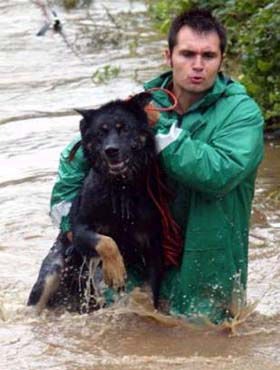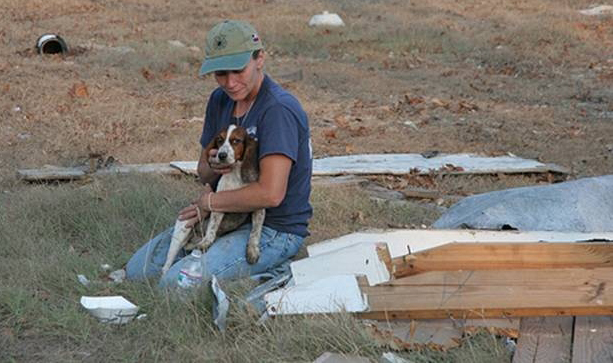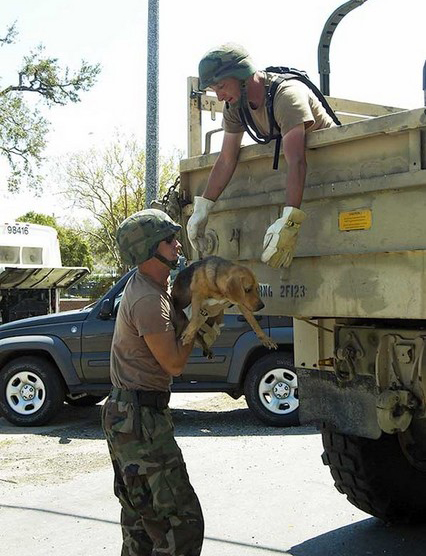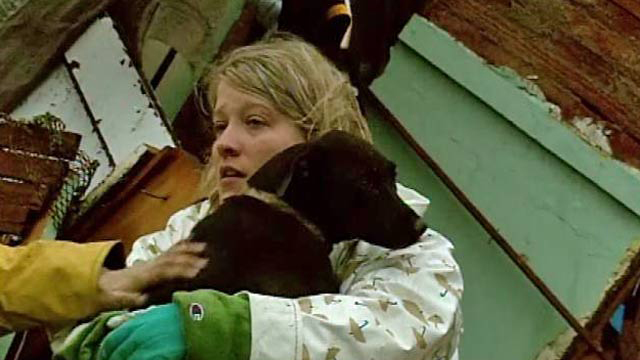 P.O. Box 542 Westminster, MD 21158 rorrcanine@gmail.com rorrfeline@gmail.com P.O. Box 542 Westminster, MD 21158 rorrcanine@gmail.com rorrfeline@gmail.comDonations are accepted: Paypal - rorrdonations@gmail.com Venmo: @RORR-RORR (1368) Zelle: rorrdonations@gmail.com Reach Out Rescue P.O. Box 542 Westminster, MD 21158 |
|
Emergency/Disaster Planning for Your Pets by Mary Brown Haak |
|
On the heels of yesterday’s rare East Coast earthquake and with Hurricane Irene soon to be bearing down on the East Coast, now seems like a great time to think about emergency preparedness. Since 9/11 and Hurricane Katrina, Americans have been bombarded with messages about emergency preparedness and what you need to do to ensure the safety and security of your family. We’ve been told repeatedly to prepare an emergency kit, One of the most important steps you should take before disaster strikes is microchipping your pets and registering your microchip information with a reputable pet-recovery service. Please be sure to update your contact information with the service whenever changes occur. If you and your pets get separated, this is your best chance for having them returned to you. You should also take photos of yourself with your pet. In the case of a dispute over ownership, this is an additional item in your favor and may result in the return of your pet much faster than if ownership disputes need to be settled through other means. Your pet should always have a collar or harness with its rabies tag and an identification tag with your name and contact information. Emergency Supply Kit In addition to the emergency supply kits you prepare for yourself and your family, you need to prepare an emergency kit for your pet(s) that includes:
If you have a nervous dog, include a thundershirt (helps to relieve nervousness and anxiety) and prescription medication for anxiety relief in your emergency kit. Pack your supplies in a duffle bag, garbage can, or plastic crate with a tight-sealing top and keep it in an easily accessible location. Keep one kit for home and another “travel” kit in your car. Evacuation
Emergency responders at the national, state and local levels learned during the aftermath of Katrina, other hurricanes, tornados, wildfires, earthquakes, volcanoes, mudslides and other disasters that many people simply refuse to evacuate unless they can take their pets. As a result, some municipalities have made changes to their emergency sheltering plans to accommodate people who bring their pets with them. In most cases your animals cannot shelter with you, but will be housed in a safe location nearby, perhaps in a temporary building or trailer. You still need to make preparations. Shelters, veterinarians, and kennels that will accommodate your pets may require proof of registration and vaccinations, and a crate or travel kennel for containing your pet. You should also make alternate plans in the event that there is no space available for your pet.
If your emergency plan calls for you and/or your pets to be housed with friends or relatives, or in a hotel/motel in another city, research veterinarians, emergency animal clinics, and kennels in those locales and include the names and phone numbers for them in your emergency kit. Research hotels and motels, both locally and in your evacuation city, and along your evacuation route which allow pets, and keep their numbers in your emergency supply kit. One wonderful resource for finding pet-friendly accommodations is Petswelcome.com. They provide information on accommodations along your evacuation route, along with information on the size/type of pets allowed and fees charged (if that information is available). They also have an Android phone app that provides information on pet-friendly accommodations during disasters. Sheltering In-Place You should also make plans for sheltering in-place in the event you are unable to evacuate. Select an interior room, such as a utility room, closet, bathroom or hallway on the lowest floor during a thunderstorm, tornado, or hurricane. Avoid rooms with windows and doors to avoid the possibility of being cut by breaking glass. It should be easily assessable to you and your pets, and be as free as possible of objects that could become airborne if the storm decides to take aim at your roof or walls. Crating your pets is recommended—even a normally placid pet can become agitated during a bad storm. To the extent possible, stay calm. Your pets are highly attuned to your emotions, so if you remain calm, they will feel more secure. If you have time ahead of the storm, fill your bathtub. You may not have running water during a power loss. Find your flashlights and battery-powered radio, and close drapes and blinds. During a hurricane the winds may slow down or stop. You may just be in the eye of the storm and the winds could pick back up at any time! Stay tuned to your radio for conditions. Be cautious about letting your pets loose after a major storm—they may become disoriented and lost if there has been major damage and familiar landmarks are gone. — Earthquakes and Sheltering In-Place
— Flooding and Sheltering In-Place Your safest course of action during a flood is to evacuate. If you have not evacuated, move yourself, your pets, and your emergency supplies to a room in the upper floor of your house; or in a single level house, move to a room with counters or shelves that you and your pets can get up on. If possible, you want a room with access to the outside through a window or door. Turn off utilities (electric, gas, and water) at the main switch in your house. Do not touch electrical equipment if you are wet or standing in water. Hang something bright red (construction paper, large towel, blankets, or other item) in a front window to notify emergency responders that you require assistance. A green item tells them you don’t need assistance or you have evacuated, and they should bypass your house. Click here to obtain “Pets inside” stickers for your doors and windows, and list the number and types of pets and emergency contact information for firefighters and rescue personnel. If you evacuate with your pets, mark “Evacuated with Pets” across your stickers. Please take a few minutes to prepare an emergency plan for your pets now, so you will all be safe during an emergency! You might also find this book of interest, Orphans of Katrina by Karen O'Toole. |




 have an established family communications plan in place, and to prepare emergency supply kits for both evacuation and shelter-in-place (this means, stay where you are and select a small, interior room with no or few windows, and take refuge there). But have you made plans for your pet in an emergency? They are counting on you to protect them and keep them safe.
have an established family communications plan in place, and to prepare emergency supply kits for both evacuation and shelter-in-place (this means, stay where you are and select a small, interior room with no or few windows, and take refuge there). But have you made plans for your pet in an emergency? They are counting on you to protect them and keep them safe.
 In the event of an evacuation, you may not be allowed access to your home. Partner with a friend, neighbor, or family member to care for your pets, or evacuate your pets, in case you can’t. Someone who is home during your normal work hours is ideal. Make sure he or she has keys to your house; let them know where your emergency kits are; and designate meeting places, one close by and one further away, where you will meet in the event of an emergency. You may want to make arrangements with family or friends away from your local area who are willing to house you and your pets in the case of an emergency.
In the event of an evacuation, you may not be allowed access to your home. Partner with a friend, neighbor, or family member to care for your pets, or evacuate your pets, in case you can’t. Someone who is home during your normal work hours is ideal. Make sure he or she has keys to your house; let them know where your emergency kits are; and designate meeting places, one close by and one further away, where you will meet in the event of an emergency. You may want to make arrangements with family or friends away from your local area who are willing to house you and your pets in the case of an emergency. In an earthquake, you and your animals should seek shelter away from windows and doors to avoid breaking glass. You want to find an area free from bookshelves, pictures, heavy light fixtures, and other items that could fall on you and your pets. Go to a hallway, interior room, or the interior corner of a room. You should only stand in a doorway if you are certain it’s on a load-bearing wall. Get beneath a table, desk, or other heavy piece of furniture where you are protected from falling objects and hold on until the shaking stops. If there is no furniture close by, crouch in an interior corner. If you are inside, you should not go outside. If you are already outside, you want to get away from anything that could fall on you such as a building, trees, signs, light poles, or overhead power lines. If you are driving, pull over away from buildings and overpasses or other structures that could fall on your car. Again, to the extent possible, you want to remain calm so that your pets will feel more secure.
In an earthquake, you and your animals should seek shelter away from windows and doors to avoid breaking glass. You want to find an area free from bookshelves, pictures, heavy light fixtures, and other items that could fall on you and your pets. Go to a hallway, interior room, or the interior corner of a room. You should only stand in a doorway if you are certain it’s on a load-bearing wall. Get beneath a table, desk, or other heavy piece of furniture where you are protected from falling objects and hold on until the shaking stops. If there is no furniture close by, crouch in an interior corner. If you are inside, you should not go outside. If you are already outside, you want to get away from anything that could fall on you such as a building, trees, signs, light poles, or overhead power lines. If you are driving, pull over away from buildings and overpasses or other structures that could fall on your car. Again, to the extent possible, you want to remain calm so that your pets will feel more secure.